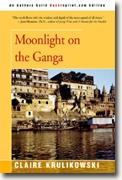 MOONLIGHT ON THE GANGA
MOONLIGHT ON THE GANGAWhen this book came to me for review I was captivated by the pretty cover picture of one of the ghats, or stairs, lining the Ganges. Wasn't sure though whether it would turn out to be a traveler's journey or a seeker's. That it was the latter isn't surprising given the large number of people who are drawn to India to partake in what is considered her spiritual heritage!!!
And no river epitomizes this heritage more than the Ganga, or Ganges. One of the largest rivers of India, the Ganga is considered holy and sacred by those of the Hindu faith. Legend has it that in ancient times, the goddess Ganga agreed to fall from the heavens upon the earth to save her mortal devotee, a king named Bhagiratha whose ancestors, having been burnt to ash, could only be freed for salvation by her pure waters. So mighty was she that when she cascaded from the heavens, the world was in danger of being washed away by her strong currents. So Lord Shiva, one of the gods of the holy Hindu trinity, gallantly stepped in and offered his locks to receive her waters and then gently lowered her to flow over the plains of India. Given her divine source and her short stay on Shiva’s locks, Ganga is worshipped as a goddess and a spiritual entity by millions of Indians who address the river as Ganga Maa or Mother Ganges and believe that her water can wash their sins, heal them, and help them attain Nirvana or Moksha, the freedom from the cycle of death and rebirth.
Originating from the Himalayas in Northern India, the Ganga traverses hundreds of miles through the heartland till it flows into the sea, supporting a population of more than half a billion. Along its banks are India's numerous towns and cities, sacred as well as densely populated - cities such as Hardwar, Varanasi, Allahabad and Rishikesh. For hundreds of years, these towns and cities have welcomed seers and believers who seek spirituality and tranquility. Today, the wheels of modernity that churn in a new and vibrant India have also touched these places. Seekers and seers now brush shoulders with a local populace leading a regular lifestyle, so that alongside Nirvana, one finds the huge rich-poor divide, the squalor, the poverty and petty crime. All this, I guess, also makes for an odd, unreal, and in some ways spiritually uplifting experience for most non-Indians unused to the heterogeneity of many centuries living side by side.
When author Claire Krulikowski lands in India, first in Delhi and then Rishikesh, she is enveloped with a sense of calm and belonging. Many Indians find this strange and often roll their eyes in disgust at the thought of anyone, let aside firangs coming from the land of plenty, finding peace amidst the poverty and squalor that permeates these towns. My own take is that perhaps there is an element of calm in the chaos and some sort of cheer amidst the fatalism that draws them.
In many ways the society of these towns and indeed, in many parts of India, is relatively open and inclusive. There is, of course, nothing magnanimous about it. In a place that is teeming with life and where swamis, monkeys, shopkeepers, other pilgrims, godmen all jostle for room, acceptance is not a concept anymore, but becomes a necessity. This openness is what draws the author more and more into the country, its people and its mores. She starts to feel a sort of inner peace in this mishmash of wealth and poverty, spiritualism and materialism, acceptance and rejection. Her journey through Rishikesh and its ghats and her interactions with sadhus, lepers, monkeys and cows as well as ordinary people fill her with an immense joy which somehow translates through her writings. (Although I was guffawing at her
experience with a mother cow!!!)
A pleasurable read, funny in places and disgusting in some. Although I would maintain that it is not the sacred or the divine that is the source of her well-being and peace; rather, it is the dichotomies of chaos and order, tradition and modernity that impart a surreal character to her life in India, a surrealism that makes her and others more casual, accepting, trusting and open-minded.

0 Comments:
Post a Comment
<< Home